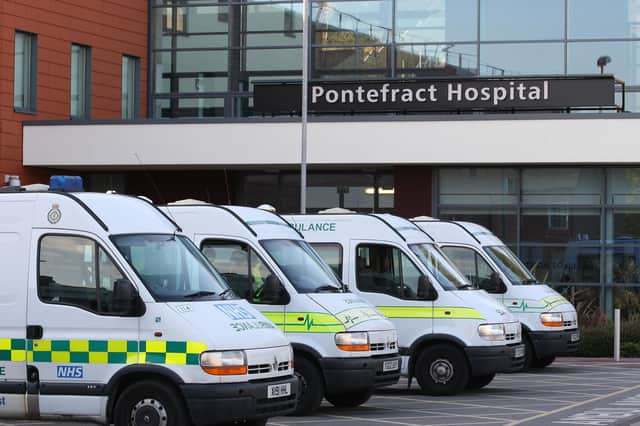NHS chiefs say only go to busy Pontefract and Dewsbury A&Es if your condition is life-threatening or serious


Mid Yorkshire Hospitals NHS Trust – which runs Pontefract and Dewsbury, as well as Pinderfields Hospital in Wakefield – put the warning out after its busiest days ever were reported.
Across the country more than 550,000 patients had to wait more than four hours in major A&E units in October, which was up from 492,000 in September.
Advertisement
Hide AdAdvertisement
Hide AdDr Sarah Robertshaw, consultant in emergency medicine at Mid Yorkshire, said: If you’re having a heart attack or stroke, or have a severe injury then of course you need to come to our emergency department.
"For more minor conditions, such as cuts, colds, coughs, sneezes, sore eyes or minor sprains, please phone 111, use our urgent treatment centre, or contact your GP or optician as they will be able to help you avoid the very long waits that we have in our emergency departments.”
Dr Tim Cooksley, president of the Society for Acute Medicine, described the increase in waiting times reported earlier this month as “unacceptably poor” and said it was likely to get worse.
Trudie Davies, chief operating Officer at the Mid Yorkshire Hospitals NHS Trust, said: “Healthcare services across West Yorkshire are very busy at the moment, and everyone is working extremely hard to provide patients with the care they need and deserve.
Advertisement
Hide AdAdvertisement
Hide Ad“As is the case for many hospitals across the country we are seeing extremely high attendances at our A&E departments at Pinderfields and Dewsbury hospitals. We are therefore continuing to ask the public to please use A&E services correctly, and consider if A&E is really where you need to be.
“If you are unsure, please access other community NHS services, such as your local GP or pharmacy, or use the NHS 111 service before coming to A&E.
"NHS 111 call handlers are trained to help you and make sure you get the right urgent treatment in the right place.
"We are also working with our GP partners across the district to provide alternatives to A&E, if appropriate.
“We ask the public to please continue to help and support us by making the right decision about where to access medical care.”